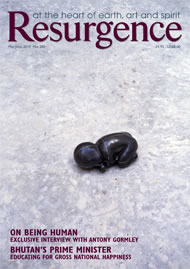Stuart Kauffman (born 1939) is by no means a fundamental theologian striving to beat science into submission with some creationist agenda. Having had a key role at Santa Fe Institute in the 1990s laying the ground of complexity theory, and now a professor at the University of Calgary and founding director of the Institute of Biocomplexity and Informatics, he is simply a thorough scientist collating the evidence. What he finds is that reductionism does not add up as an adequate explanation of how the world works.
Kauffman has turned the tables on the paradigm of science many times. Always willing to respond to science from the position of an independent inquiry, he has opened many new roads that have later come to carry the traffic of mainstream thinking. In his current book, he makes a new decisive turn; a space for the ‘sacred’ to be freshly voiced.
Classical science forever imagines it can catch the universe as a precisely described problem fitting snugly in a mathematical net. At university, studying mathematics, all the problems one is given are precise situations with exactly known starting conditions, which can be parcelled up in a neat solution. Yet, once one moves on from university there is a real dilemma in that the world thrives on ambiguity, plurality and an abundance of ways of doing things. How then to fit the round pegs of the world into the square holes of exact problem solving?
Complexity and chaos theory, as developed by Kauffman and others, see the world beyond the need to furnish exact solutions to the question of living. Typically, natural systems work with a highly adaptive response to potential that can reorganise as context demands, in antithesis to the goal of science to discover a unique order that fixes things in a historic account of how the world came to be.
This dichotomy of purposes is illustrated in many examples of the limitation of reductionism in modern science:
1. A genetic programme unable to fully explain the organism;
2. The mystery left in the heart of physical law as to how the universe chose the right constant to allow life to emerge;
3. The chaotic tendency of large systems to respond unpredictably to minute “butterfly” effects;
4. Quantum theory abandoning a direct mathematical description of individual events at the elementary particle level;
5. A relativity that blurs the edges of any objective description.
Kauffman calmly comes to the scientific conclusion that science cannot deliver a full account of reality from a consideration of abstract parts. Instead he comes to the questions: How do we act when we cannot know? What possible means do we have to carry on with life, ‘living it forward’, as Kierkergaard said? We live forward into mystery. But how?
Kauffman is not asking this question with an ulterior agenda of evangelism, but genuinely as a scientist making sense of the world. He is asking for science to take a new road, where it looks seriously into the nuances of meaning which participation in the world entails. He sees the necessity for science to go beyond the boundary of its own many successes and invites us to celebrate “our own created, lived, meaningful, unforeseeable human culture”.
In this latest offering Kauffman takes us on a journey where the sacred looks beyond the ground of knowledge, exhaustively describing phenomena from within. Crucially, he justifies his proposal by including the sacred as part of science, rather than describing another theory presented as if beyond any doubt.
The main success of the book is to feel that it is possible to have both views upon the table. His sacredness might disappoint some and his science might seem as surrender to others, but as happened with complexity, this book opens up the arena for debate. Re-engaging with the unknowable opens new horizons where purely rationalistic understanding has been unable to take us.
When consulting about the state of the Earth in global forums, it should be the heart feeling awe that is the guide of the council as to how to commit our resources and maximise the bonds of connection across the world. A delicate inquiry allows us to steer choice to answer to the beauty of the world. The universe must welcome the responsibility of a new ethic for our living.






